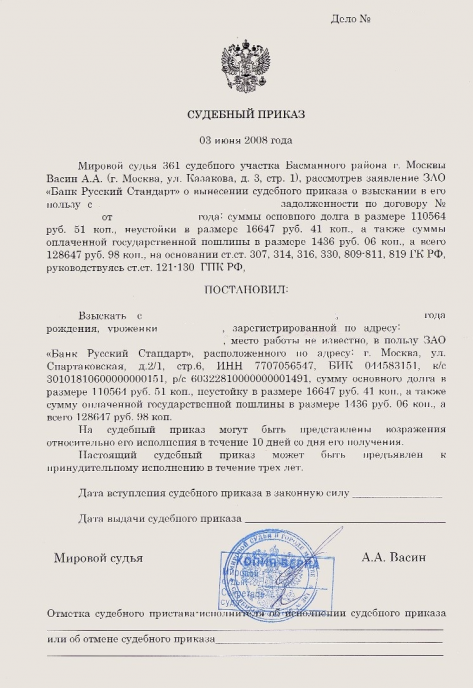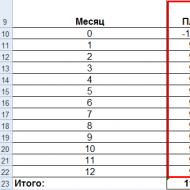
Cancellation of a court order: application, terms. How to cancel a court order?
A court order in civil law is a decision of a judge, single-handedly issued without notifying the parties and without hearing in a meeting on the basis of a claimant's application for the recovery of movable property or for the reimbursement of sums of money by the debtor.
Writ proceedings in resolving civil cases are considered a simplified procedural form.
The claimant is the party that makes claims in writ proceedings. The debtor is the obligated party. The term for issuing a decision is five days.
The court order, being an executive document, is aimed at its enforcement in the manner prescribed by law.
It provides efficiency and effectiveness in decision making. This is especially true in cases of recovery of alimony, in which delaying the process can lead to unnecessary consequences for the parties. Since the order is a simplified form of legal procedures, it helps to increase the efficiency and effectiveness of judicial protection.
Requirements that are the basis for issuing an order
The claimant chooses from several options. He can file a claim with the appropriate authority or file a petition for the issuance of a court order. This is stated in the legislation. At the same time, it strictly limits the requirements for which the order in question is issued:

Application Process
The court order is issued on the basis of the submitted application. This request is submitted to the jurisdiction of the judicial authority and is paid a certain state fee. Its size is equal to fifty percent of the rate accepted for statements of claim.
An application for a court order is always in writing. It is not taken orally. It indicates the name of the judicial authority to which the recoverer submits an application, full name. claimant and debtor, their location or address of residence. It is also necessary to indicate the requirements for the debtor, and the circumstances that are the basis for the submitted claims. All this is accompanied by documents confirming the legality and validity of the claims made, and a list of certificates and papers attached to the application. If the petition concerns the recovery of movable property, then it must indicate the value of the object. 
At the end of the application, the creditor must certify it with a signature. If such a request is submitted by an official representative, then a document confirming the authority of this person must be attached to it.
Grounds for returning an application
Civil law provides for certain grounds that are the reason for the return of an application for a court decision in order to eliminate them. These grounds include the following:
- Failure to pay the state fee required for filing an application.
- Lack of documents to support claims of the claimant.
- Violation of the general requirements for the content or form of the document.
The application may be re-submitted to the appropriate body after the elimination of the violations indicated by the court.
Grounds for refusal to accept an application
If the application is returned, the claimant may correct the deficiencies and reapply to the court. If an application has been denied, the person has no legitimate reason at all to submit the application. Grounds for refusal include the following:
- A demand is made that is not a reason for issuing an order.
- The debtor is located or permanently resides outside of Russia.
- From the submitted documents and the application itself, the existence of a dispute about the right can be traced.
If the court decides to refuse to accept or return the application, then this body issues a ruling within three days from the date of receipt of this application.
- Name of the court.
- The date the order was issued.
- Production number.
- The initials and surname of the judge who issued the order.
- Surname and initials of the claimant and the debtor.
- The citizen-debtor must indicate the date of his birth and place, as well as the place of work.
- The law that serves as the basis for satisfying the stated requirement.
- The amount of money to be collected, penalties, as well as fines.
- Designation of movable property with an indication of its value.
- The amount of state duty to be collected from the debtor.
- Bank details of the claimant's account.
- The period of formation of the claimed debt under obligations.
If a court order is issued in relation to the recovery of alimony, then an indication of the place and date of birth of the debtor, as well as the place of his work, is added to the above list. The document also indicates the name and date of birth of each minor child, the amount of monthly payments and the period for their collection.
The document under consideration shall be signed by the judge and drawn up in two copies. This is done on a special form. One copy of the order remains in court, the second is given to the claimant, and the debtor is given a copy.
Notification of the debtor about the decision
After the order is issued, a copy of it is sent to the debtor. This is done by mail. The debtor, within ten days after receiving the document, may submit objections regarding its execution. If he does not do this, then the court decision comes into force.
Cancellation of a court order
In the event that the debtor submits objections regarding the implementation of the order within the period specified by law, the judge cancels it. This request is annulled by issuing a ruling. What is written in it? In the ruling, the judge explains to the exactor about his right to demand, in the course of action proceedings, the implementation of the stated claims. The decision to cancel the court order from the date of its issuance shall be sent to the parties. In this case, the parties receive only a copy of the ruling. And the appeal document itself is not subject to withdrawal. 
How to cancel a loan order?
There are situations in which the debtor receives an order from the court. In it, bank debt, in his opinion, exceeds the actual one. Or, for example, when the debt to the bank was fully repaid, but the borrower did not take a certificate confirming this. The client has the right to apply to the relevant authority with an application to cancel such an order.
Since a court order is issued at the request of a bank or a collector without checking the data indicated in the application itself, and without the participation of the parties, credit organizations often use this opportunity to their advantage. In addition, this procedure for filing claims is subject to a small state fee. And the application can include all kinds of penalties, fines and other penalties in relation to the bank's client.
The debtor learns about the issued court order only after receiving a notification by mail, in a week or even two. Or he becomes aware of this after a call from the bailiffs. It is important not to miss the deadline set by law for the cancellation of a court order. Recall that it is ten days from the date of its receipt. To do this, it is enough to send an application to the world court that issued the order to recover the loan. Documents may be sent by mail or delivered in person. An application for the cancellation of a court order must be drawn up in triplicate. Two petitions are forwarded to the relevant authority. The third application is given with a stamp of receipt to the person who sends it to the court.
Cancellation of a court order for a loan (see sample below) is possible, even if the deadlines stipulated by law are missed. To do this, you must write a request for the restoration of missed days. If the court considers these reasons to be objective, then the terms will be restored, and the citizen will have the right to file an application to cancel the court order.
Most often, credit organizations rely on the legal illiteracy of the debtor and on the fact that the person will not cancel the court order. This is due to the fact that many do not know about the right to cancel it, therefore they do not go to court in a lawsuit. This forces the debtor to have certain obligations to the bank. 
Issuance of an order to the claimant
If the application for the cancellation of the court order is not received by the appropriate body from the debtor within the period specified by law, the recoverer receives a second copy of the document certified by the seal. At the request of the claimant, the order in question is sent to the bailiff for implementation.
If the borrower wishes to receive a state fee from the debtor, a writ of execution is provided, which is issued to the bailiff.
Alimony
Is it possible to cancel a court order for the recovery of alimony? In this case, the debtor within ten days has the right to apply to the relevant body that issued the court order to cancel it. In the application, it is enough to indicate your disagreement without justifying it.
If the debtor still wishes to indicate the grounds, then the cancellation of the court order can be for several reasons:
- Lack of income or low salary of the debtor.
- The presence of loans or credits that must be repaid monthly.
- Disability due to disability, etc.
In this case, the basis must be documented.
What to do when the order has already entered into force?
Cancellation of a court order that has entered into force is also possible. There are situations in which the debtor was not familiar with the decision, and in the meantime it has already passed into the state that has entered into force. Consequently, the citizen missed the deadlines established by law for appealing the document in question. In this case, the cancellation of the court order occurs by filing objections with the Magistrate's Court that issued this decision. In the latter, it is necessary to indicate, in addition to the requirements for cancellation, a request for the restoration of the missed period, which was not taken into account through no fault of the debtor. The reasons must be given. In most cases, this practice has a positive result. The judge cancels the order.
Next stage
So, if the writ has already been cancelled, what's next? When the decision in question has been annulled, a ruling on that fact shall be issued. It clarifies the right to apply to the Magistrate's Court in the order of action proceedings by filing a claim against the debtor. The decision to cancel is not subject to appeal. 
Claim proceedings are distinguished by the fact that the plaintiff is obliged to appear in court and substantiate his claims and objections.
The difference between a court order and a judgment
There are some similarities and differences between a court order and a court decision. What are they expressed in? Similarities lie in the judicial body, which has the right to make such decisions, and in the form of enforcement.
The decision is not subject to cancellation by the court that issued it, in contrast to the order. In this case, the cancellation of the court order is carried out by the person who issued it.
The decision consists of four parts, and the court order - of two: introductory and resolutive.
















